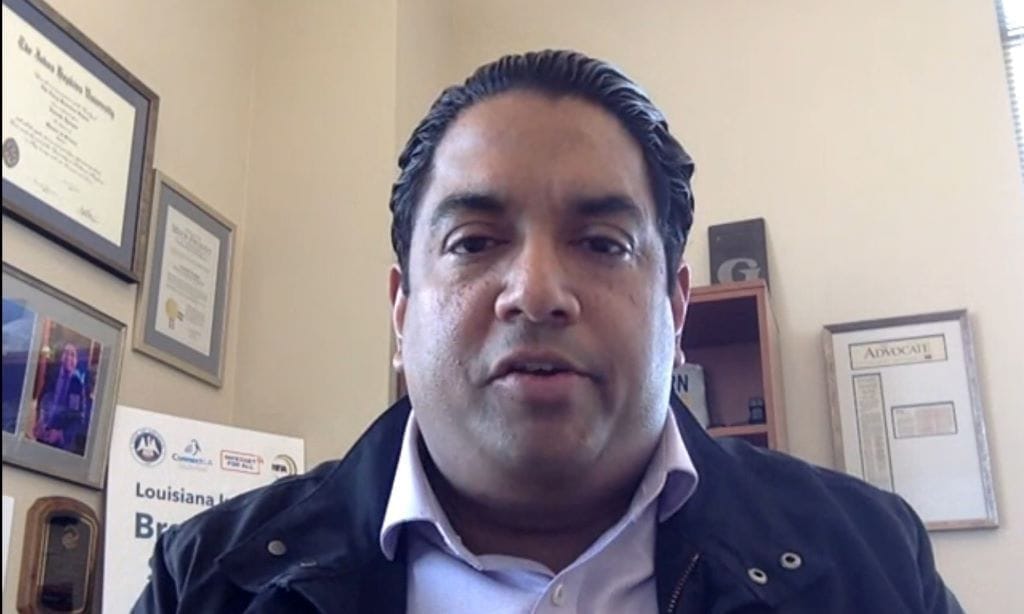Louisiana Planning on Final BEAD Approval 'Any Day Now'
It's the final step before projects can get underway.
Jake Neenan

WASHINGTON, Jan. 8, 2025 – Louisiana is expecting approval on its final spending plan for $748 million in broadband expansion grants “any day now,” the state’s broadband head said Wednesday.
“We’re planning to hopefully get approval any day now. Once that happens, we’re on track to signing subgrant agreements probably within the next 30 or 45 days,” said Veneeth Iyengar, executive director of Louisiana’s broadband office. He spoke at a Fiber Broadband Association webinar.
The state was the first to produce a draft of its final spending plan for the Broadband Equity, Access, and Deployment program, a $42.5 billion federal effort to end the digital divide. Louisiana was allocated more than $1.3 billion, and is planning to spend its surplus cash, more than $500 million, on workforce development and other efforts. Its plan will have to be approved by the National Telecommunications and Information Administration, the federal agency tasked with handling BEAD.
There’s been speculation that the incoming Trump administration might be inclined to alter the program—GOP lawmakers have criticized its preference for fiber and Trump donor and advisor Elon Musk owns the satellite ISP Starlink. That evidently hasn’t stopped at least 20 states from fielding grant applications under the current rules, or Louisiana from submitting its final proposal.
NTIA Administrator Alan Davidson is stepping down Jan. 20, and it’s not clear who will take his post. The agency’s BEAD director, Evan Feinman, and his staff are staying put. Feinman has downplayed the idea of any disruptive changes coming down the road.
Louisiana plans to fund fiber to more than 95 percent of its 140,000 BEAD-eligible homes and businesses. Like many states are planning to do, the broadband office is going with satellite for its most remote locations—about 2,800—which Iyengar said received no interest through multiple bidding rounds and direct provider negotiations.
SpaceX’s Starlink and Amazon’s Kuiper Systems signed up to participate in BEAD in Louisiana, but the state hasn’t nailed down which it’s going to go with. Iyengar said he was briefing his superiors in the governor’s office today on the situation.
“So hopefully we’ll come to some sort of a resolution on those 2,800 locations, probably within the next couple days,” he said.
The NTIA recently released final guidance on funding alternative technologies like fixed wireless and low-earth orbit satellite broadband, which Louisiana’s early-bird status prevented it from making use of, but Iyengar said it was mostly aligned with the state’s approach.
Keys to success
Iyengar was proud of the state’s process, saying it “resulted in what we thought was a maniacally efficient, competitive process for our BEAD funds.”
He attributed that success to several things, including how the state set up its project areas. Those are the geographic areas providers could bid to serve with BEAD support.
The state set up more than 1,800 project areas and, like some other states, went through a comment period in which ISPs offered feedback before solidifying them. The smaller size gave companies more flexibility to bid on combinations that would give them a positive business case, Iyengar said.
“That was really important,” he said.
Louisiana also used data from CostQuest, the contractor that puts together broadband data for the federal government, to calculate a rough funding target for each area, which bids got more scored against. Iyengar said those ended up being pretty accurate, with bids generally coming in at 1.07 times the state benchmarks.
Another key was having multiple grant rounds, he said. The vast majority of locations received multiple bids in the first round, leading to a robust second round in which companies were asked to come back with another bid. In that second round, Iyengar said participants asked for about 20 percent less support.
“That was the approach that we wanted,” he said. “You wanted companies to ask for a whole sum number in the first round, and then to sharpen their pencils in the second round.”
Louisiana didn’t give extra points for applicants that promised to put up more of their own cash beyond the 25 percent of project costs required by NTIA. That was made easier by the state’s surplus of BEAD funding, but Iyengar credited it with helping get more local companies involved. A total of 30 companies participated in Louisiana, with more than 70 percent of its $748 million in deployment money ultimately going to in-state companies.









Member discussion